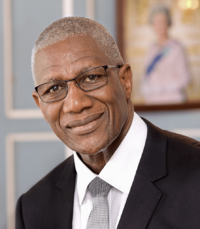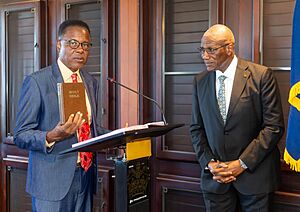Governor-General of Antigua and Barbuda facts for kids
Quick facts for kids Governor-General of Antigua and Barbuda |
|
|---|---|

|
|

Emblem
|
|
| Viceroy | |
| Style | His Excellency |
| Abbreviation | GG |
| Residence | Government House |
| Appointer | Monarch of Antigua and Barbuda
on the advice of the prime minister
|
| Term length | At His Majesty's pleasure |
| Precursor | Governor of Antigua |
| Formation | 1 November 1981 |
| First holder | Sir Wilfred Jacobs |
| Deputy | Deputy Governor-General |
| Salary | 108,630 XCD annually |
| Website | https://gg.gov.ag/ |
The Governor-General of Antigua and Barbuda is a very important person. They act as the representative of the monarch of Antigua and Barbuda, who is currently Charles III. Think of them as the monarch's official stand-in for the country.
The Prime Minister of Antigua and Barbuda suggests who should be the Governor-General. Then, the monarch officially appoints them. The Governor-General has many duties. They appoint important people like ministers, senators, judges, and ambassadors. They also approve new laws and call for elections. The Governor-General is also the leader of the Antigua and Barbuda Defence Force. They serve for as long as the monarch wishes. However, they are usually replaced when a new political party wins an election.
Besides their official duties, the Governor-General also does many community and ceremonial things. They give important speeches, welcome foreign ambassadors, and hand out awards. They also represent the country at special events. The Governor-General usually stays neutral in politics. They always follow the advice of the Prime Minister. A team of staff helps the Governor-General with their work.
Before this role, there was a "Governor of Antigua" starting in 1632. This position changed names and roles many times. This happened as Antigua and Barbuda joined different groups of colonies. The title sometimes changed to lieutenant governor or administrator. At one point, the Governor of Antigua was in charge of the entire British Leeward Islands.
The role of Governor-General began when Antigua and Barbuda became an independent country. This happened on November 1, 1981. Since then, four people have held this position. All of them were from Antigua, and three were men. Most Governors-General were either former politicians or experts in different fields. Many people in Antigua and Barbuda want to move away from their colonial past. Because of this, some think the Governor-General should become the official head of state. This would happen if the country decided to become a republic.
Contents
History of the Governor-General Role
Before the Governor-General role was created, Antigua and Barbuda had a Governor of Antigua. This position started way back in 1632. In 1671, the role changed to a lieutenant governor. This was when the British Leeward Islands were formed. From 1747 to 1816, the Leeward governor directly managed the islands.
The Governor of Antigua role came back in 1816. In 1833, the Governor of Antigua also became the Governor of the Leeward Islands. These roles were combined in 1872. In 1936, an administrator took over the role. When Antigua became an Associated State of Antigua in 1967, the governorship was brought back.
Since the Governor-General position started, the Prime Minister usually suggests who should take the role. This happens soon after the Prime Minister takes office. One time, Louise Lake-Tack was appointed three years after Baldwin Spencer became Prime Minister. Later, the government asked for her to be removed. This was because she was not working well with the government. Since then, the Governor-General usually acts only with the government's advice.
How a Governor-General is Chosen
Any citizen of Antigua and Barbuda can be chosen as Governor-General. The monarch appoints them. There is no set time limit for how long they serve. The Governor-General serves for as long as the monarch wishes. This means the monarch can remove them at any time. If the position is empty, only the monarch can fill it.
For example, in 2007, the position was empty after Sir James Carlisle finished his term. In 2014, the government successfully asked the monarch to remove Louise Lake-Tack. They said she was "uncooperative."
What the Governor-General Does
The Governor-General has many important duties under the Constitution of Antigua and Barbuda. They use the monarch's power to run the country. All executive powers belong to the monarch.
Role in Parliament
The Governor-General appoints all members of the Senate. Ten of these appointments are suggested by the Prime Minister. One must be a Barbuda resident, also suggested by the Prime Minister. One is suggested by the Barbuda Council. Four are suggested by the leader of the opposition. The Governor-General can choose one person on their own. The Governor-General can also declare a Senate seat empty. This happens if the person who suggested them agrees, or if the Barbuda resident senator moves away from Barbuda.
All new laws passed by Parliament must be approved by the Governor-General. This is called royal assent. The Governor-General can only refuse to approve a law if they think it goes against the Constitution. The Governor-General can also temporarily stop Parliament meetings. This is done by an official announcement. After talking with the Prime Minister, the Governor-General can also end Parliament. This means new elections will be held.
If a vote shows that the Prime Minister no longer has enough support, the Governor-General can also end Parliament. This happens if the Prime Minister does not resign or ask for new elections within seven days. If Parliament is ended, the Governor-General can bring back the previous Parliament in an emergency. This is done with the Prime Minister's advice. The Governor-General chooses the date for a general election. This must be within three months after Parliament is ended. As soon as possible after an election, the Governor-General must appoint the seventeen senators.
The Governor-General also sets the boundaries for voting areas. At least one of these areas must be in Barbuda. The Governor-General also appoints members of the Constituencies Boundaries Commission. This is done with advice from the Prime Minister and the leader of the opposition. The Governor-General can also appoint the Supervisor of Elections. This is done through an official notice.
Role in the Government
The Governor-General appoints the Prime Minister. The Prime Minister must be a member of Parliament who has the support of most members. This is usually the leader of the winning party. All other ministers are also appointed by the Governor-General. This is done with the Prime Minister's advice. New government departments can be created by laws. Or, if allowed, the Governor-General can create them with the Prime Minister's advice. The Governor-General can also give ministers their specific jobs. They can also appoint parliamentary secretaries, attorneys-general, and some members of a committee that advises on pardons.
The Governor-General can also grant pardons to criminals. They can also reduce or change punishments. The Governor-General must also appoint the director of public prosecutions. This is done with advice from the Judicial and Legal Services Commission. They also appoint various other government officials.
List of Governors-General
Here is a list of the people who have served as Governor-General of Antigua and Barbuda since the country became independent in 1981.
Denotes acting governors-general
| No. | Portrait | Name (Birth–Death) |
Term of office | Monarch (Reign) |
||
|---|---|---|---|---|---|---|
| Took office | Left office | Time in office | ||||
| 1 |  |
Sir Wilfred Jacobs (1919–1995) |
1 November 1981 |
10 June 1993 |
11 years, 221 days |  Elizabeth II  (1981–2022) |
| 2 |  |
Sir James Carlisle (b. 1937) |
10 June 1993 |
30 June 2007 |
14 years, 20 days | |
| Vacant (30 June – 17 July 2007) | ||||||
| 3 |  |
Dame Louise Lake-Tack (b. 1944) |
17 July 2007 |
14 August 2014 |
7 years, 28 days | |
| 4 |  |
Sir Rodney Williams (b. 1947) |
14 August 2014 |
Incumbent | 11 years, 190 days | |
 Charles III  (2022–present) |
||||||
See also
 In Spanish: Gobernador general de Antigua y Barbuda para niños
In Spanish: Gobernador general de Antigua y Barbuda para niños
 | William Lucy |
 | Charles Hayes |
 | Cleveland Robinson |



